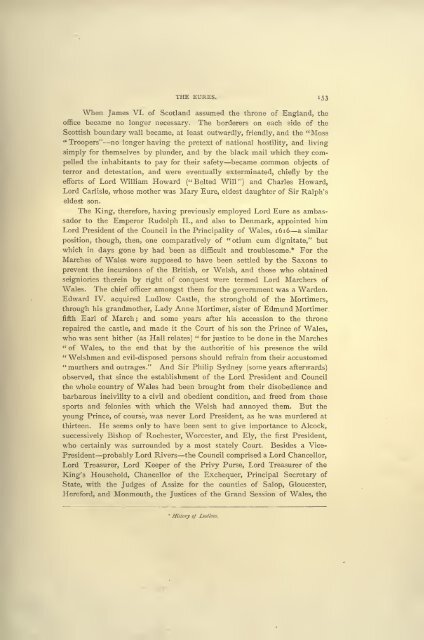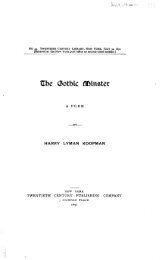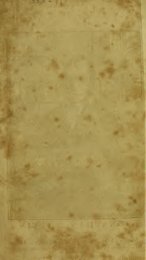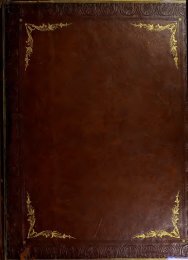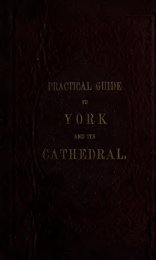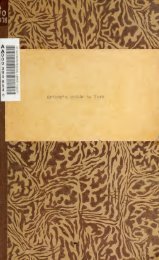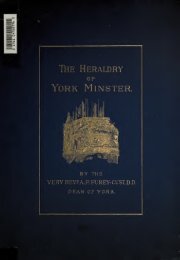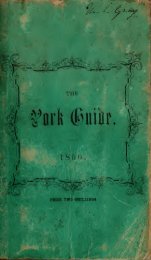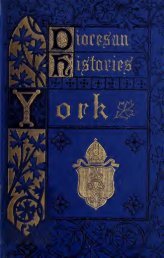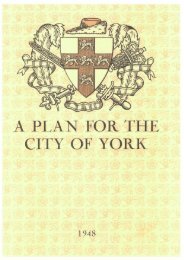- Page 1:
HE HERALDRY OF YORK MINSTER BY THE
- Page 5:
Cbe Tberalfcrv of lj)orfc fllMnster
- Page 9 and 10:
THE HERALDRY OF /HMneter: A KEY TO
- Page 11 and 12:
TO H.R.H. PRINCE ALBERT VICTOR OF W
- Page 13:
TO H.R.H. PRINCE ALBERT VICTOR OF W
- Page 16 and 17:
viii. PREFACE. with which this volu
- Page 18 and 19:
X. TABLE OF CONTENTS. THE FESS 2 47
- Page 20 and 21:
xii. LIST OF COLOURED ILLUSTRATIONS
- Page 23 and 24:
THE HERALDRY OF YORK MINSTER. INTRO
- Page 25 and 26:
INTRODUCTION. The arms of Willoughb
- Page 27 and 28:
INTRODUCTION. 25 " rude and stormy
- Page 29 and 30:
Tennyson INTRODUCTION. 27 one of En
- Page 31 and 32:
INTRODUCTION. 29 inanimate, which w
- Page 33 and 34:
INTRODUCTION. 31 engraved on an ena
- Page 35 and 36:
INTRODUCTION. 33 1317. nth of Ed. I
- Page 37 and 38:
INTRODUCTION. 35 " the horns of gia
- Page 39 and 40:
INTRODUCTION. 37 " Loose in the win
- Page 41 and 42:
INTRODUCTION. 39 down, but seemed t
- Page 43 and 44:
INTRODUCTION. 4 ! chapter of the co
- Page 45 and 46:
INTRODUCTION. 43 " who saluted me g
- Page 47 and 48:
INTRODUCTION. 45 " To him that disc
- Page 49 and 50:
INTRODUCTION. 47 That it had become
- Page 51 and 52:
INTRODUCTION. 49 The effort was, ho
- Page 53 and 54:
INTRODUCTION. 5 1 And lastly, Edmun
- Page 55 and 56:
INTRODUCTION. 33 1 ' A vesture Woic
- Page 57 and 58:
INTRODUCTION. 55 The ostrich plume
- Page 59 and 60:
INTRODUCTION. 57 brown in summer, i
- Page 61 and 62:
INTRODUCTION. 59 or lambskin should
- Page 63 and 64:
INTRODUCTION. 6 1 The Chevaliers de
- Page 65 and 66:
INTRODUCTION. 63 feeling sure that
- Page 67 and 68:
INTRODUCTION. when they heard the t
- Page 69 and 70:
INTRODUCTION. link of the chain-arm
- Page 71 and 72:
INTRODUCTION. 6 9 In royal armoury,
- Page 73 and 74:
INTRODUCTION. 7 1 The attendant arm
- Page 75 and 76:
INTRODUCTION. 73 each side of the a
- Page 77 and 78:
INTRODUCTION. 75 Margaret Savage se
- Page 79 and 80:
INTRODUCTION. 77 was the fate of th
- Page 81 and 82:
THE BEND. AVING now considered the
- Page 83 and 84:
THE BEND. 8 I shoulder. Planche als
- Page 85:
PLATE i. SCROPE OF BOLTON. SCROPE A
- Page 88 and 89:
84 THE HERALDRY OF YORK MINSTER. so
- Page 90 and 91:
86 THE HERALDRY OF YORK MINSTER. An
- Page 92 and 93:
88 THE HERALDRY OF YORK MINSTER. he
- Page 94 and 95:
go THE HERALDRY OF YORK MINSTER. to
- Page 96 and 97:
Q2 THE HERALDRY OF YORK MINSTER. me
- Page 98 and 99:
94 THE HERALDRY OF YORK MINSTER. en
- Page 100 and 101:
9 6 THE HERALDRY OF YORK MINSTER. S
- Page 102:
" I will weep for thee ; 98 THE HER
- Page 105 and 106:
THE SCROPES. 99 clearly established
- Page 107:
J5irJfenyjScrof(> . ffittilliam (pr
- Page 110 and 111:
102 THE HERALDRY OF YORK MINSTER. n
- Page 112 and 113:
I0 4 THE HERALDRY OF YORK MINSTER.
- Page 115 and 116: He was probably buried in THE DE MA
- Page 117 and 118: THE DE MAULEYS. 107 (this sum, acco
- Page 119 and 120: THE DE MAULEYS. IOQ John de Hotham,
- Page 121 and 122: THE DE MAULEYS. I I I small monaste
- Page 123 and 124: THE DE MAULEYS. 113 royal ladies we
- Page 125 and 126: THE DE MAULEYS. 115 the safety of R
- Page 127 and 128: THE DE LEYBOURNES. 117 Larking, fro
- Page 129 and 130: THE DE LEYBOURNES. 119 Thus transla
- Page 131 and 132: * TREHOUS. I 2 I TREHOUS. But now f
- Page 133 and 134: TREHOUS. 123 soldiers to Arthur, a
- Page 135 and 136: TREHOUS. 125 " gatherings of his ad
- Page 137 and 138: TREHOUS. 127 Hubert, therefore, tho
- Page 139 and 140: TREHOUS. 129 " clime over the walls
- Page 141: PLATE 3. HOTHAM. HASTINGS. E u RE.
- Page 144 and 145: 132 THE HERALDRY OF YORK MINSTER. A
- Page 146 and 147: IJ4 THE HERALDRY OF YORK MINSTER. t
- Page 148 and 149: 136 THE HERALDRY OF YORK MINSTER. c
- Page 150 and 151: 138 THE HERALDRY OF YORK MINSTER. E
- Page 152 and 153: 140 THE HERALDRY OF YORK MINSTER. I
- Page 154 and 155: 142 THE HERALDRY OF YORK MINSTER. o
- Page 156 and 157: 144 THE HERALDRY OF YORK MINSTER. A
- Page 158 and 159: 146 THE HERALDRY OF YORK MINSTER. p
- Page 160 and 161: 148 THE HERALDRY OF YORK MINSTER. s
- Page 162 and 163: 150 THE HERALDRY OF YORK MINSTER. e
- Page 166 and 167: 154 THE HERALDRY OF YORK MINSTER. C
- Page 168 and 169: 156 THE HERALDRY OF YORK MINSTER. s
- Page 170 and 171: . July 158 THE HERALDRY OF YORK MIN
- Page 172 and 173: 160 THE HERALDRY OF YORK MINSTER. "
- Page 174 and 175: 1 62 THE HERALDRY OF YORK MINSTER.
- Page 176 and 177: 164 THE HERALDRY OF YORK MINSTER. d
- Page 178 and 179: 1 66 THE HERALDRY OF YORK MINSTER.
- Page 180: 1 68 THE HERALDRY OF YORK MINSTER.
- Page 183 and 184: THE LUTERELS. 169 THE LUTERELS. A s
- Page 185 and 186: THE FURNIVALS. 171 Thomas de Furniv
- Page 187 and 188: THE FURNIVALS. 173 " used for lawye
- Page 189 and 190: He also bequeathed " Unam peciam "
- Page 191 and 192: WALWORTH. 177 in the meantime, the
- Page 193 and 194: WALWORTH. 179 they surged onwards t
- Page 195 and 196: WALWORTH. l8l demagogue, still diss
- Page 197 and 198: " Worthy John Lovekyn, stock-fishmo
- Page 199 and 200: THE HOTHAMS. 185 that such an honou
- Page 201 and 202: THE HOTHAMS. 187 his uncle, as well
- Page 203 and 204: THE HOTHAMS. 189 The eldest son, Pe
- Page 205 and 206: of ElyḂut Hugh, Alice's son, and
- Page 207 and 208: THE HOXHAMS. 193 and the men to sta
- Page 209 and 210: THE HOTHAMS. 195 An excellent Frenc
- Page 211 and 212: THE HOTHAMS. 197 with his son and S
- Page 213 and 214: THE HOTHAMS. 199 accepted, in what
- Page 215 and 216:
WALLER. 201 arms are Shirley, becau
- Page 217 and 218:
WALLER. 203 " theyr jackes were lon
- Page 219 and 220:
WALLER. 205 overwhelming sense of m
- Page 221 and 222:
WALLER. 207 As soon as the terrible
- Page 223 and 224:
WALLER. 209 In the British Museum t
- Page 225 and 226:
The shady trees, the green meadows,
- Page 227 and 228:
DE BOHUN. 213 He seems, however, to
- Page 229 and 230:
DE BOHUN. 215 which, down to 1516,
- Page 231 and 232:
DE BOHUN. 217 that he was instigate
- Page 233 and 234:
THE CHEVRON. "None of the ordinarie
- Page 235 and 236:
CLARE. 221 Richard FlTZ-GlLBERT de=
- Page 237 and 238:
CLARE. 223 The Earl, as a token of
- Page 239 and 240:
CLARE. 225 Despencer. He assumed th
- Page 241 and 242:
CLARE. 227 " consumed with a linger
- Page 243 and 244:
CLARE. 229 many shields, not only o
- Page 245 and 246:
CLARE. 231 Reyny (afterwards Archbi
- Page 247 and 248:
CLARE. 233 "this ground, that when
- Page 249 and 250:
CLARE. 235 " owes for the fruits of
- Page 251:
i PLATE 5. . Lr . n n D O n n D n D
- Page 254 and 255:
THE HERALDRY OF YORK MINSTER. By hi
- Page 256 and 257:
240 THE HERALDRY OF YORK MINSTER. B
- Page 258 and 259:
242 THE HERALDRY OF YORK MINSTER. P
- Page 260 and 261:
244 THE HERALDRY OF YORK MINSTER. A
- Page 262 and 263:
246 THE HERALDRY OF YORK MINSTER. V
- Page 264 and 265:
248 THE HERALDRY OF YORK MINSTER. B
- Page 266 and 267:
250 THE HERALDRY OF YORK MINSTER. "
- Page 268 and 269:
252 THE HERALDRY OF YORK MINSTER. "
- Page 270 and 271:
254 THE HERALDRY OF YORK MINSTER. B
- Page 272 and 273:
256 THE HERALDRY OF YORK MINSTER. t
- Page 274 and 275:
258 THE HERALDRY OF YORK MINSTER. A
- Page 276 and 277:
260 HERALDRY OF YORK MINSTER. Among
- Page 278 and 279:
262 THE HERALDRY OF YORK MINSTER. "
- Page 280 and 281:
264 THE HERALDRY OF YORK MINSTER. T
- Page 282 and 283:
2 66 THE HERALDRY OF YORK MINSTER.
- Page 284 and 285:
268 THE HERALDRY OF YORK MINSTER. f
- Page 286 and 287:
270 THE HERALDRY OF YORK MINSTER. T
- Page 288 and 289:
272 THE HERALDRY OF YORK MINSTER. H
- Page 290 and 291:
274 THE HERALDRY OF YORK MINSTER. t
- Page 292 and 293:
276 THE HERALDRY OF YORK MINSTER. "
- Page 294 and 295:
278 THE HERALDRY OF YORK MINSTER. t
- Page 296 and 297:
280 THE HERALDRY OF YORK MINSTER. "
- Page 298 and 299:
282 THE HERALDRY OF YORK MINSTER. h
- Page 300 and 301:
284 THE HERALDRY OF YORK MINSTER. r
- Page 302 and 303:
286 THE HERALDRY OF YORK MINSTER. E
- Page 304 and 305:
288 THE HERALDRY OF YORK MINSTER. O
- Page 306 and 307:
2QO THE HERALDRY OF YORK MINSTER. "
- Page 308 and 309:
292 THE HERALDRY OF YORK MINSTER. T
- Page 310 and 311:
294 THE HERALDRY OF YORK MINSTER. T
- Page 312 and 313:
296 THE HERALDRY OF YORK MINSTER. e
- Page 314 and 315:
298 THE HERALDRY OF YORK MINSTER. t
- Page 316 and 317:
300 THE HERALDRY OF YORK MINSTER. d
- Page 318 and 319:
302 THE HERALDRY OF YORK MINSTER. "
- Page 320 and 321:
304 THE HERALDRY OF YORK MINSTER. "
- Page 322 and 323:
306 THE HERALDRY OF YORK MINSTER. a
- Page 324:
308 THE HERALDRY OF YORK MINSTER. "
- Page 327 and 328:
FITZALAN AND POYNTZ. 309 in London,
- Page 329 and 330:
FITZALAN AND POYNTZ. 3 I I Standard
- Page 331 and 332:
FITZALAN AND POYNTZ. 313 Minster. A
- Page 333 and 334:
of FITZALAN AND POYNTZ. 315 So if B
- Page 335 and 336:
But in many instances THE VAVASOURS
- Page 337 and 338:
THE VAVASOURS. 319 That held opinio
- Page 339 and 340:
THE VAVASOURS. 321 from the lesson
- Page 341 and 342:
THE VAVASOURS. 323 Percy gave a spe
- Page 343 and 344:
' And THE VAVASOURS. 325 beside bei
- Page 345 and 346:
THE VAVASOURS. 327 Sir Henry Lee, o
- Page 347 and 348:
VALENCE. 329 been a blessing to men
- Page 349 and 350:
VALENCE. 331 "time was seen the lik
- Page 351 and 352:
VALENCE. 333 This act was hailed wi
- Page 353 and 354:
VALENCE. 335 of his latter they the
- Page 355 and 356:
MORTIMER. 337 with such a valuable
- Page 357 and 358:
MORTIMER. 339 The London populace p
- Page 359 and 360:
MORTIMER. 341 ever, she has passed
- Page 361 and 362:
MORTIMER. 343 charity, " made," say
- Page 363 and 364:
MORTIMER. 345 invaded Ireland, givi
- Page 366 and 367:
THE WHITE H-ORSE AT U FF/N GTOM, BE
- Page 368:
348 THE HERALDRY OF YORK MINSTER. a
- Page 371 and 372:
ROYAL HERALDRY. 349 theory by which
- Page 373:
PLATE 7. FRANCE. EDMUND E.OF CROUCH
- Page 376 and 377:
352 THE HERALDRY OF YORK MINSTER. b
- Page 378 and 379:
356 THE HERALDRY OF YORK MINSTER. "
- Page 380 and 381:
358 THE HERALDRY OF YORK MINSTER. a
- Page 382 and 383:
360 THE HERALDRY OF YORK MINSTER. h
- Page 384 and 385:
362 THE HERALDRY OF YORK MINSTER. p
- Page 386 and 387:
364 THE HERALDRY OF YORK MINSTER. L
- Page 388 and 389:
366 HERALDRY OF YORK MINSTER. furni
- Page 390 and 391:
368 THE HERALDRY OF YORK MINSTER. o
- Page 392:
370 THE HERALDRY OF YORK MINSTER. H
- Page 395 and 396:
ROYAL HERALDRY. 371 Edmond Tudor, s
- Page 397 and 398:
ROYAL HERALDRY. 373 upon his own he
- Page 399 and 400:
ROYAL HERALDRY. 375 He spent vast s
- Page 401 and 402:
ROYAL HERALDRY. 377 the leading war
- Page 403 and 404:
ROYAL HERALDRY. 379 wealthy and ind
- Page 405 and 406:
ROYAL HERALDRY. 381 Alonzo's consen
- Page 407 and 408:
' ROYAL HERALDRY. 383. which would
- Page 409 and 410:
ROYAL HERALDRY. 385 " pest of Franc
- Page 412 and 413:
PLATE 9. BLANCHE OF CASTILE. EDMONO
- Page 414 and 415:
388 THE HERALDRY OF YORK MINSTER. a
- Page 416 and 417:
3QO THE HERALDRY OF YORK MINSTER. T
- Page 418 and 419:
392 HERALDRY OF YORK MINSTER. Forti
- Page 420 and 421:
394 THE HERALDRY OF YORK MINSTER. o
- Page 422 and 423:
396 THE HERALDRY OF YORK MINSTER. m
- Page 424:
398 THE HERALDRY OF YORK MINSTER. a
- Page 427 and 428:
ROYAL HERALDRY. 399 " the world by
- Page 429 and 430:
ROYAL HERALDRY. 401 Stubbs, in his
- Page 431:
ROYAL HERALDRY. 40,3 How he was est
- Page 434 and 435:
406 GENERAL INDEX. Clerkenwell, 223
- Page 436 and 437:
408 GENERAL INDEX. Shrewsbury, batt
- Page 438 and 439:
LIST OF SUBSCRIBERS. Aldam, W. Ande
- Page 440:
4 I2 LIST OF SUBSCRIBERS. R


